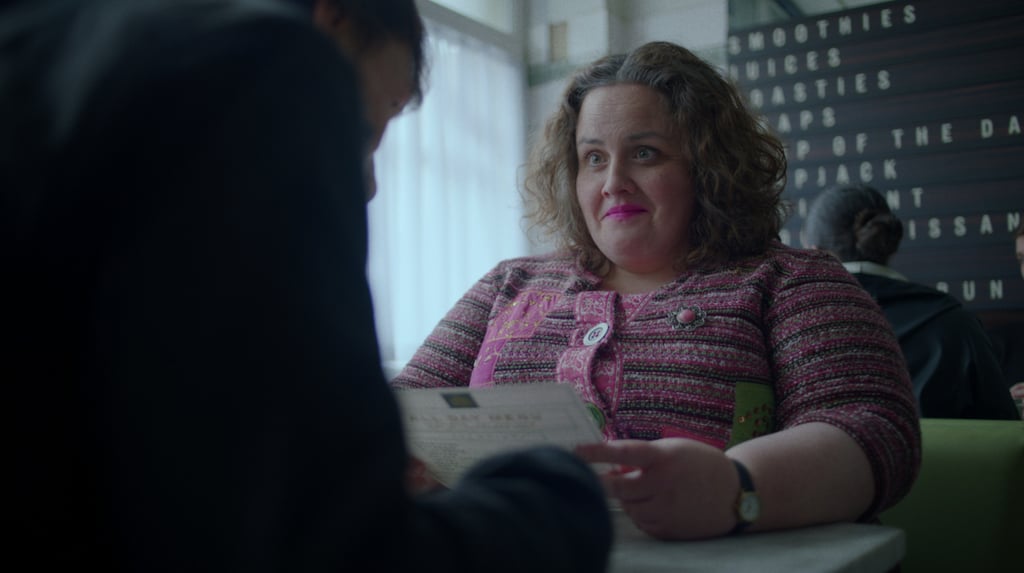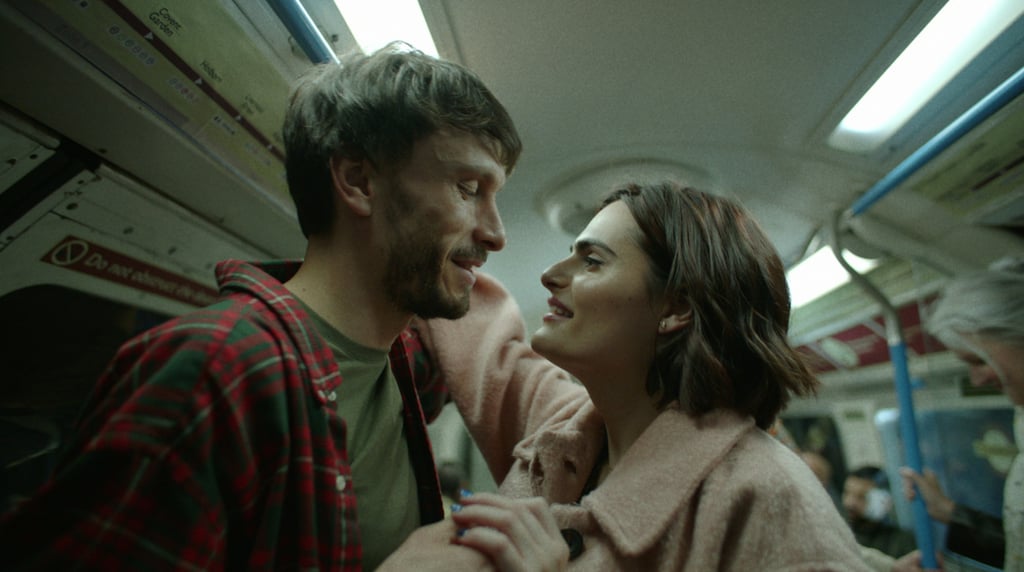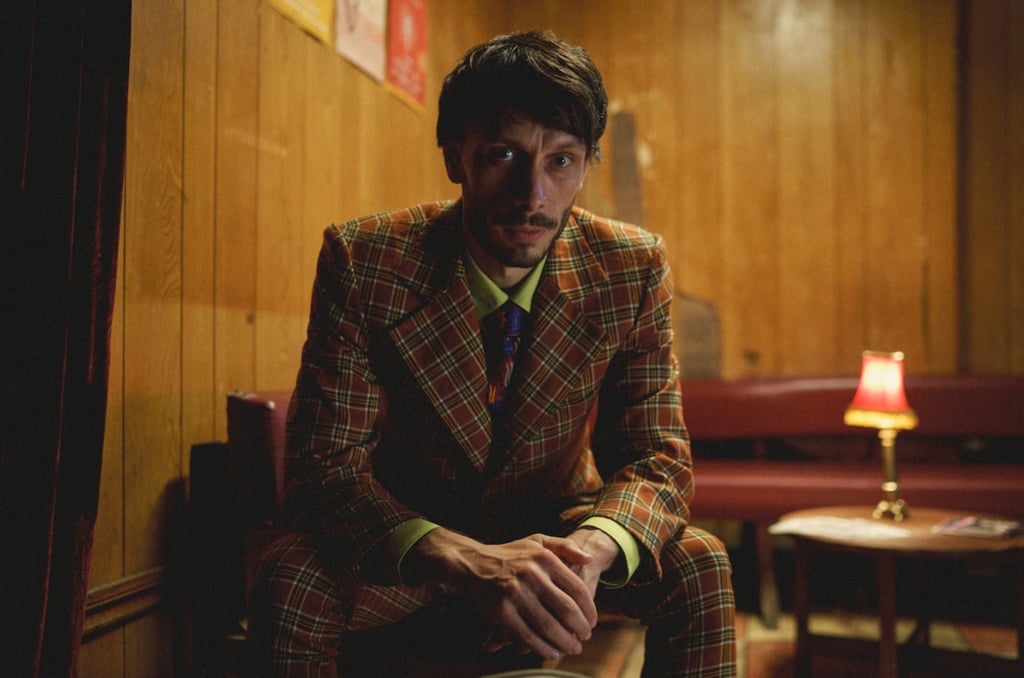On a practical level, having the most-watched series on Netflix for a couple of months running means that when you pop over from your London flat to the pub to have a drink with some mates before the Pogues gig at the Hackney Empire, you literally cannot move because people have swarmed you.

Then when Gadd went to the concert, in part a tribute to the band’s late frontman, Shane MacGowan, the same thing happened.
“But I got to meet the Pogues, and that was great,” Gadd says. “And they’d all watched the show, which I couldn’t believe, having idolised them my whole life. [Accordion player] James Fearnley said he was on his second go, which is just crazy.”
These days, when it comes to his extraordinary, new-found fame, Gadd is learning to take the good with the bad.
Sitting in a Netflix conference room with Jessica Gunning, who plays Martha, the woman who terrorises Gadd’s alter ego, struggling comedian Donny Dunn, Gadd is relaxed when the conversation focuses on the creation of the seven-part limited series.
But there is also an undercurrent of tension, owing to the fact that talk show host Piers Morgan is, while we are having this conversation, interviewing the woman who claims to be the real-life Martha. (She has since sued Netflix for defamation.)
“Unfortunately, I’m not able to comment on that,” Gadd says, glancing at one of the two Netflix publicists sitting in on the conversation. “Every character in the show, five, six, seven people have been accused of being them. I can’t police the internet. I can certainly go on record to say that I’ll never confirm or deny who they are.
“If I wanted the real-life people to be found, I would have done a documentary. These are my real-life experiences, and I chose to demonstrate them in a fictional world based on truth. All I felt I needed to show the world was the basis of that emotional truth.”
I really want to do a piece about masculinity and explore it in a way that hasn’t been done before
That emotional truth is nothing short of astonishing, the primary reason why so many viewers have streamed Baby Reindeer more than once the last few months.
Gadd’s character, Donny, is miserable. His dreams of becoming a comic have stalled and he is eking out a living as a bartender. Regrets? More than a few.
When Martha, a middle-aged woman verging on tears, sits down at the bar, Donny asks if he can get her something. A cup of tea? She protests. She cannot afford it. “How about I get you a cup of tea on the house?” Martha brightens. She is thankful. And then she will not leave him alone.
What begins as a horror story grows deeper and more complex, as Donny’s own behaviour becomes increasingly erratic, fuelled by a self-loathing and neediness rooted in shame.
The first episode begins with Donny entering a police station to report Martha. An officer asks: how long has this been going on? Six months. Why did it take you so long to report it? The answer, we learn in episode four, is devastating.
Gunning’s empathetic portrayal of Martha is vital to the series’ success. Gadd had seen her onstage and on television and thought she had an energy he associated with Martha, “bursting to get out”.
She was one of 30 or so women who auditioned, reading two first-episode scenes with Gadd – the cafe “date” between Donny and Martha that goes off the rails and the moment outside the comedy club when Martha tells Donny that she wishes humans had a chin zip that would open all the way to their bellies. “I’d just unzip them and tuck myself away,” she says.

Gunning remembers running lines from the latter scene with a friend before the audition, telling her it was one of her favourites in the show.
“I said, ‘It’s like the sweetest, almost romantic scene,’ and then my friend read it and said, ‘This is terrifying,’” Gunning says. “And it was genuinely the first time of seeing it another way. I was like, ‘Oh, is it scary?’ I thought it was a real compliment in that she found safety in the thought of being tucked inside him for winter.”
That perspective explains why she won the role.
“I was looking for someone who didn’t prioritise villainous characteristics, that the ‘madness’ was a little bit back and the vulnerability came through,” Gadd says. “A lot of people didn’t seem to get that. Only Jess seemed to.”
Baby Reindeer began as a solo stage play in 2019 with a bar stool standing in for Martha. Three years earlier, Gadd’s show Monkey See, Monkey Do, which centred on his attempts to process the fear and shame from his own sexual assault, had premiered at the Edinburgh Festival Fringe.
Both plays were successful on a small scale, and Gadd figured the limited series would just be this “weird show that’s quite niche in a way” and would occupy a little corner on the Netflix platform. Instead, he spent those initial weeks after its premiere navigating “just a hell of an adjustment”.
“I just feel quite windswept,” Gadd says. “Like, ‘Whoa, this is crazy.’”

In Baby Reindeer, Gadd’s character achieves a measure of fame, only to find it hollow and unsatisfying. Has this sudden notoriety left him feeling a bit the same way?
“Ask me in six months,” he replies, quickly adding, “I’m only joking. That’s a joke.”
Gadd goes on to talk about all the letters he has received through his agent from people saying the show has encouraged them to break their silence over trauma from their past.
He mentions that a male sexual abuse charity based in Manchester, We Are Survivors, reported an 80 per cent increase in calls since Baby Reindeer premiered, with more than half of them citing the series as the reason for reaching out.
“I can’t see it as a hollow experience when things like that are happening,” Gadd says.
He is also pleased that viewers are discussing – and largely appreciating – the series’ ambiguous ending, which mirrors the moment when Donny gives Martha the cup of tea. Only now, it is Donny sitting in a bar, distraught, and it is the bartender taking pity on him, offering a drink on the house.
Donny looks up with an expression that can be read many ways. Perhaps he is remembering that first moment with Martha. Maybe he now possesses a keener understanding of Martha. Or maybe, like Martha, this act of kindness will prompt him to fixate on the Good Samaritan offering it.
“I know what it means to me, but I don’t think I’d ever say it publicly,” Gadd says of the ending. “I think Baby Reindeer has a lot to say, but I don’t think it uses a megaphone while it’s saying it. It isn’t bellowing its morality/message down the audience’s throats.
“I like that it’s open to interpretation. I like that there’s characters people dislike and then you ask the next person and they say they really like those characters. I like that because that’s life in a way. Everything’s subjective.”

He is now focused on writing his next project, currently titled Lions (“That’s just a place holder,” he says), which follows two men, close enough to consider themselves brothers, over the course of four decades from the 1980s to the present day.
When it was announced that HBO would be co-producing this six-part BBC One show, a press release trumpeted that the series would “try to get to the bottom of the difficult question … What does it mean to be a man?”
Gadd is leaning into the challenge of writing something that is not based on his own life, as his last few projects have been.
“We’ll see what happens,” he answers, laughing. “I really want to do a piece about masculinity and explore it in a way that hasn’t been done before and just try to dig a little deeper into the difficulties around men, the difficulties around emotions and feelings. Just an exploration about the good and bad points about what it means to be a man.”

